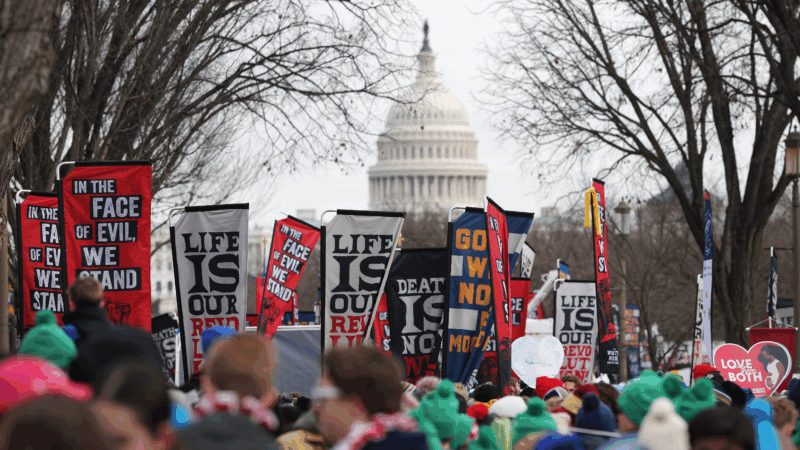The Environmental Protection Agency delays limits on PFAS in drinking water
The Environmental Protection Agency announced Wednesday that it is delaying the timeline for water utilities to comply with reducing some per- and polyfluoroalkyl substances, or PFAS chemicals, in drinking water — and reconsidering the allowable levels for others.
“The work to protect Americans from PFAS in drinking water started under the first Trump Administration and will continue under my leadership,” EPA administrator Lee Zeldin said in the announcement.
PFAS are a class of thousands of chemicals that have been used for decades to waterproof and stainproof a variety of products including clothing, cosmetics, upholstery and firefighting foams. They’re sometimes called “forever chemicals” because they contain strong molecular bonds that persist for decades. Long-term exposure to PFAS has been linked with harms to human health, such as certain cancers or damage to the liver and immune systems.
In April 2024, the EPA under the Biden Administration set limits on certain PFAS chemicals in drinking water, requiring community water systems to find alternative water sources or install filtration systems to remove them. It was the first time the agency had set enforceable caps on PFAS in drinking water, and water utilities were required to comply by 2029.
Now, the EPA is proposing to extend the compliance deadline to 2031 for two of the most common PFAS chemicals – PFOA and PFOS. And it’s rescinding and reconsidering the limits for the other four listed in the initial regulation – PFHxS, PFNA, HFPO-DA, and PFBS.
“That doesn’t mean that [the limits] gets weaker…when I go through a process and we follow the law, at the end of it, the final [levels] might be a lower number, not a higher number,” EPA administrator Lee Zeldin said at a Congressional hearing on May 14.
Some environmental advocates expressed skepticism.
“The way the issue is being framed [in the announcement] is not about providing additional protections or making it stricter,” says Anna Reade, a senior scientist with the Natural Resources Defense Council. “It’s about providing relief in terms of cost to water systems.”
Groups representing water utilities praised the move.
“We strongly support the agency’s decision to rescind the regulations…and ensure future rulemakings respect the Safe Drinking Water Act process,” read a joint email statement from the heads of the American Water Works Association and the Association of Metropolitan Water Agencies, two groups that have sued the EPA over its PFAS regulation.
They said the process requires EPA to construct rules that “maximize public health benefits in a cost-effective manner. This is critical for water systems and their communities, because the process helps ensure every ratepayer dollar is directed toward the most pressing public health risks.”
The Safe Drinking Water Act also contains a measure commonly known as the “anti-backsliding provision,” which deems it illegal to weaken a drinking water rule once it’s set, says Reade. While she’s concerned that the agency may attempt to weaken the rule regardless, “The real damage right now is that it’s delaying movement towards drinking water protections for PFAS,” she says.
The EPA estimates that 6-10% of water systems serve water with excess PFAS levels, according to the 2024 regulations, affecting some 100 million people in the U.S.
According to EPA analysis, it would cost $1.5 billion a year for water companies to comply with the regulation. The benefits of reducing PFAS in drinking water would equal or exceed the costs, the agency said, in terms of less cancer and fewer heart attacks, strokes and birth complications in the affected population.
Health advocates worry that the move will delay the removal of these chemicals from drinking water and that more people will be exposed to chemicals that may contribute to chronic health problems.
China critic and former media tycoon Jimmy Lai is sentenced to 20 years in a Hong Kong security case
Jimmy Lai, the pro-democracy former Hong Kong media tycoon and a fierce critic of Beijing, was sentenced on Monday to 20 years in prison in the longest punishment given so far under a China-imposed national security law that has virtually silenced the city's dissent.
China critic and former media tycoon Jimmy Lai is sentenced to 20 years in a Hong Kong security case
Jimmy Lai, the pro-democracy former Hong Kong media tycoon and a fierce critic of Beijing, was sentenced on Monday to 20 years in prison in the longest punishment given so far under a China-imposed national security law that has virtually silenced the city's dissent.
Center-left Socialist candidate wins over populist in Portugal’s presidential runoff
Center-left Socialist candidate António José Seguro recorded a thumping victory over hard-right populist André Ventura in Portugal's runoff presidential election Sunday, according to official results.
Seahawks win Super Bowl title, pounding the Patriots 29-13
Seattle's "Dark Side" defense helped Sam Darnold become the first quarterback in the 2018 draft class to win a Super Bowl, to win the franchise's second title.
No, that wasn’t Liam Conejo Ramos in Bad Bunny’s Super Bowl halftime show
A publicist for Bad Bunny confirmed to NPR that the little boy in a blue bunny hat detained by ICE in Minneapolis last month did not participate in the Super Bowl halftime show.
March for Life attendees may have been exposed to measles, DC Health warns
D.C. health officials are contacting people possibly exposed to measles at the March for Life in January, as confirmed cases rise nationwide.








